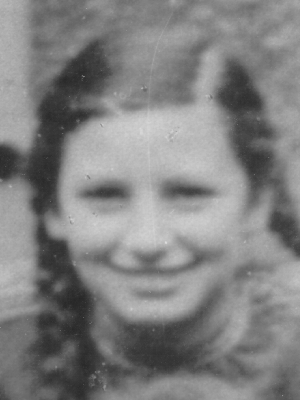
Margot, the older daughter of Johanna (Falkenstein) and Carl Heuman, grew up in Bielefeld, Germany. Her father was a successful businessman, while her mother stayed home with the children. When Hitler came to power in 1933, Margot was five years old. Antisemitic legislation soon made life difficult for Germany's Jews. Many left the country, but others felt that the situation was only temporary. They felt a strong connection with Germany and with German culture, and could not imagine that Hitler and the Nazis would manage to stay in power for any length of time. Others did not want to leave elderly relatives who could not be easily uprooted.
In 1935, the "Nuremberg Laws" were passed. These laws took away basic citizenship from all German Jews. They were barred from most professions and from public education. They were forced to sell their businesses and were segregated from the non-Jewish population. Many became impoverished.
On the night of November 9-10, 1938, country-wide acts of terror and destruction were perpetrated against Germany's Jews. Most now realized that their lives were in danger, but those who wished to leave the country found that there were very few countries that would take them in. In October 1941, Jews were no longer permitted to leave Germany. Margot and her family were trapped.
Early in 1942, fourteen year-old Margot and her family were arrested. They were sent to the Theresienstadt ghetto in Czechoslovakia. Margot and her little sister, Lore, lived in a children's home. They saw their parents every day after work. The camp was overcrowded and unsanitary, and the food was minimal. Many died of hunger and disease. There were frequent deportations of people who were sent to death camps in Poland.
In May 1943, Margot and her family were selected for transport to Auschwitz. Margot was sent to the women's barracks, where she worked as a slave laborer and endured overwhelming hardships. Her little sister, who had managed to stay with her, was murdered a few months later.

